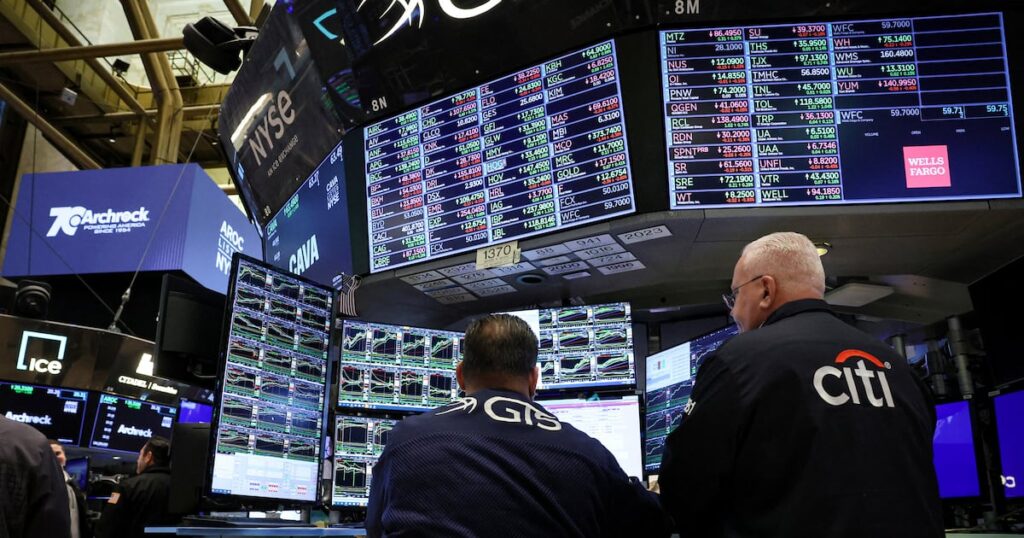U.S. stocks had their best week so far this year, driven by gains in the world's biggest technology companies.
The latest inflation data was broadly in line with expectations, which also provided support for Wall Street.
The S&P 500 and Nasdaq posted their biggest weekly gains since early November 2023.
On Friday, the S&P 500 rose 1.02% to close at around 5,100, while the tech-heavy Nasdaq 100 rose nearly 2%. The Dow Jones Industrial Average rose 0.4%.
MSCI's global stock index rose 0.9% to 762.39 on positive results from Alphabet and Microsoft and optimism for the tech sector.
The yield on the 10-year U.S. Treasury note fell 4 basis points to 4.67%.
Google's parent company Alphabet on Thursday announced it would issue its first dividend at 20 cents per share and authorized a stock buyback program worth $70 billion.
The world's largest provider of search and video ads reported a 15% increase in revenue from January to March to more than $80.5 billion, beating analysts' expectations of $78.5 billion.
Microsoft reported stronger-than-expected profits and revenue, driven by its push for artificial intelligence and increased adoption of cloud solutions globally.
The company's net income increased 20% on an annual basis to $21.9 billion. Sales for the January-March period rose 17% to $61.9 billion, beating analysts' expectations of $60.8 billion.
These helped offset Intel's 9.2% decline. The company reported higher-than-expected profits for its latest quarter, but sales fell short of analysts' expectations.
“Microsoft and Google's Alphabet soared in after-hours trading after reporting reasonably strong results that beat expectations,” said Ipek Ozkardeskiya, senior analyst at Swissquote Bank.
“Microsoft rose more than 4% on better-than-expected sales and profits, thanks to solid business demand for its cloud and AI products, while Google rose 11%, driven by its own cloud business. ”
Bloomberg cited UBS Global Wealth Management's Solita Marcelli as saying that the latest results from big tech companies helped strengthen Big Tech's foothold and offset concerns about the macroeconomic backdrop.
“We continue to emphasize that tech fundamentals remain strong and the recent correction has provided an interesting entry point for tech and AI stocks, especially with the big tech moves in the first quarter,” Marcelli said. said.
U.S. data also boosted sentiment, with the personal consumption expenditure (PCE) price index rising 0.3% in March, in line with economists' expectations.
PCE inflation rose 2.7% in the 12 months to March, compared to expectations of 2.6%.
Stocks have been under pressure across the board this month as hopes for the Federal Reserve to cut interest rates multiple times this year have faded.
Traders now expect only one rate cut this year, down from forecasts for more than six cuts in early 2024, after reports that inflation remains higher than expected.
The Fed is likely to postpone its next policy meeting on Wednesday following the inflation data.
The country's main interest rate remains at its highest level since 2001 as government authorities seek to curb inflation by putting downward pressure on the economy and financial markets.
“Inflation slowed last year thanks to less post-pandemic stimulus, but still strong demand is now fueling inflation. And that’s a problem the Fed can address by keeping policy tight.” ,” Ozkardeszka said.
“Swap traders are now pricing in 35 basis points of rate cuts for all of 2024, a downward revision from the six rate cuts priced in at the beginning of the year.”
If interest rates remain high, companies will need to generate stronger profits to drive up stock prices.
According to FactSet, profits of about three out of four companies exceeded analyst expectations.
Updated: April 27, 2024, 5:33 a.m.

